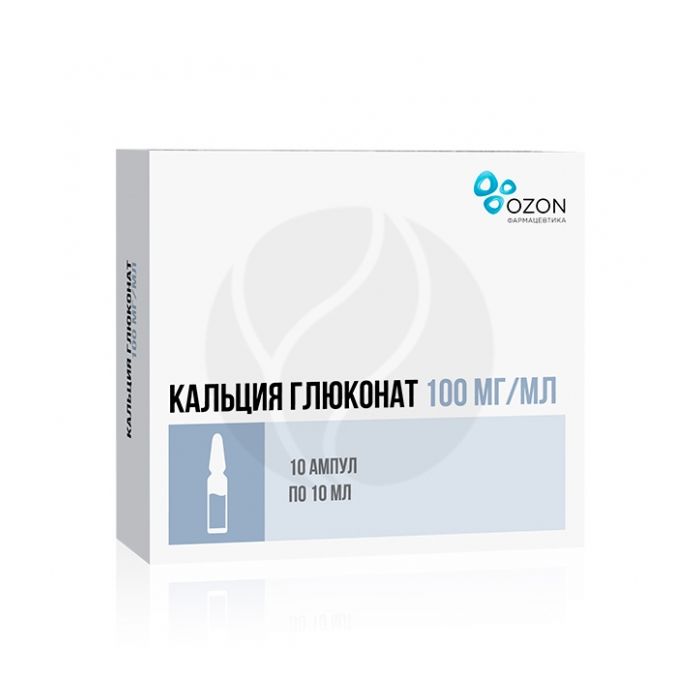Calcium gluconate solution for injection 10%, 10ml No. 10 Ozone
Expiration Date: 05/2027
Russian Pharmacy name:
Кальция глюконат раствор для инъекций 10%, 10мл №10 Озон
Hypocalcemia of various origins,
hypoparathyroidism,
parenchymal hepatitis,
toxic liver damage,
nephritis,
eclampsia,
hyperkalemic form of paroxysmal myoplegia,
inflammatory and exudative processes, skin diseases.
As an additional remedy in the treatment of allergic diseases and drug allergies.
As an additional hemostatic agent for pulmonary, gastrointestinal, nasal, uterine bleeding.
As an antidote for poisoning with magnesium salts, oxalic acid and its soluble salts.
With intravenous or intramuscular injection of calcium gluconate solution, a single dose of the drug should correspond to 2.25-4.5 mmol of calcium.
A solution of calcium chloride is injected intravenously in a stream (slowly) in a single dose of 500 mg, intravenously drip - in a single dose of 0.5-1 g.
Solution for i / v and i / m administration
calcium gluconate 94 mg
Hypercalcemia
severe hypercalciuria
severe renal failure
tendency to thrombosis,
hypersensitivity to calcium gluconate.
pharmachologic effect
Calcium - a macronutrient involved in the formation of bone tissue, the process of blood coagulation, is necessary to maintain stable cardiac activity, processes of transmission of nerve impulses. Improves muscle contraction in muscular dystrophy, myasthenia gravis, reduces vascular permeability. With the on / in the introduction of calcium causes excitement of the sympathetic nervous system and increased adrenal secretion of adrenaline; has a moderate diuretic effect.
Indications of the active substances of the drug Calcium gluconate
Hypocalcemia of various origins,
hypoparathyroidism,
parenchymal hepatitis,
toxic liver damage,
nephritis,
eclampsia,
hyperkalemic form of paroxysmal myoplegia,
inflammatory and exudative processes, skin diseases.
As an additional remedy in the treatment of allergic diseases and drug allergies.
As an additional hemostatic agent for pulmonary, gastrointestinal, nasal, uterine bleeding.
As an antidote for poisoning with magnesium salts, oxalic acid and its soluble salts.
Side effect
Possibly: nausea, vomiting, diarrhea, bradycardia; with i / m introduction - necrosis.
Contraindications for use
Hypercalcemia
severe hypercalciuria
severe renal failure
tendency to thrombosis,
hypersensitivity to calcium gluconate.
Application for impaired renal function
Contraindicated in severe renal failure.
Use with caution in patients with mild hypercalciuria, with minor renal dysfunction or with a history of urolithiasis; in these cases, the level of urinary calcium excretion should be regularly monitored. Patients with a tendency to form calculi in the urine are advised to increase the amount of fluid consumed.
Application in children
It is not recommended to be administered intramuscularly to children.
special instructions
Use with caution in patients with mild hypercalciuria, with minor renal dysfunction or with a history of urolithiasis; in these cases, the level of urinary calcium excretion should be regularly monitored. Patients with a tendency to form calculi in the urine are advised to increase the amount of fluid consumed.
It is not recommended to be administered intramuscularly to children.
Drug interactions
Calcium gluconate, when used simultaneously, reduces the effect of calcium channel blockers. Intravenous administration of calcium gluconate before or after verapamil reduces its hypotensive effect, but does not affect its antiarrhythmic effect. Under the influence of cholestyramine, the absorption of calcium from the gastrointestinal tract is reduced. With simultaneous use with quinidine, it is possible to slow down intraventricular conduction and increase the toxicity of quinidine. During treatment with cardiac glycosides, parenteral administration of calcium gluconate is not recommended due to increased cardiotoxicity. With the simultaneous oral administration of calcium gluconate and tetracyclines, the effect of the latter may decrease, due to a decrease in their absorption.

